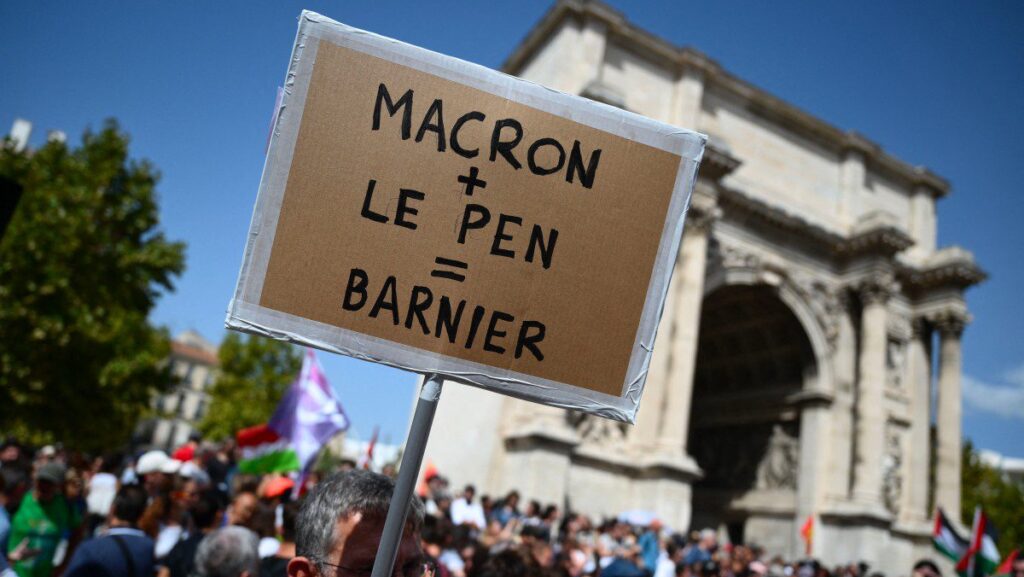
A demonstrator holds placard reading “Macron + Le Pen = Barnier” take part in a demonstration against the appointment of Prime Minister Michel Barnier by France’s President Emmanuel Macron in Marseille, southern France, on September 7, 2024.
Photo: Christophe SIMON / AFP
After the apparent defeat in the parliamentary elections, in which the Rassemblement National (RN) came 3rd, the appointment of the new Prime Minister Michel Barnier puts Marine Le Pen’s party in a particularly favourable strategic position, as it can now decide whether the government will remain in power. How can the RN hope to stay in control of the political game in the coming weeks?
The expectations of the national right party were very high at the time of the snap legislative election in June 2024. Numerous polls showed it as a potential winner and suggested that Jordan Bardella, the party’s president, could become prime minister. But the strength of the left-wing opposition organisation, with alliances created to defeat the RN at all costs, relegated the party to third place in the national assembly—even though it remains the leading party in terms of membership outside the leftist coalition, and the leading party in terms of votes nationally.
Marine Le Pen, who heads a 142-strong parliamentary group for the RN and its allies, now intends to build on this popularity capital to make a decisive impact on French politics. After intense negotiations, the appointment of Barnier was only possible because the RN wanted him. All the candidates for the post previously considered by Emmanuel Macron were ultimately rejected one after the other because they were too likely to immediately be overturned by a motion of censure in the national assembly. In the case of Barnier, the RN announced that he would not be censured—at least not immediately. This was enough to convince the president that he was the right person, after a “secret deal” with Marine Le Pen, in the words of the Journal du Dimanche.
The Left is now particularly up in arms against Barnier, whom it considers to be the fruit of an unnatural union between Emmanuel Macron and Marine Le Pen. The slightest move he makes, the first decision he takes, he will be branded a far-right minister, as protesters chanted in the streets on Saturday, September 7th.
The power now in the hands of the Rassemblement National is huge because it, and it alone, can decide whether to keep the new government alive. For the government to be overthrown, a ‘motion of no confidence’ must be passed by a majority of MPs. This majority is not attainable without the votes of the RN. In all likelihood, the RN will not propose a motion on its own: it would risk looking foolish, as the other MPs, obsessed with the cordon sanitaire, will not vote for a motion coming from the RN—on principle. But if the motion comes from the Left, the RN will vote for it if it is in the party’s interest. The RN therefore has a radical means of pressure without having to make the first move and thus risk being accused of obstruction against the government. As many observers of French political life have pointed out, the RN is now truly a “kingmaker”—a great political success behind the appearance of defeat.
The ridge line that the RN is trying to follow, with varying degrees of success, has been the same for months: play the card of respectability and respect the institutions. Be respectable and respected. It is therefore in RN’s interest to wait for the right moment to topple the Barnier government in order to maximise the party’s political message. The vote on the budget for 2025 will certainly provide a favourable context since France is in a particularly uncomfortable situation financially and will be faced with some difficult choices. The budget’s general rapporteur, independent MP Charles de Courson, pointed out that in the current political situation, it is “impossible” to return to the 3% deficit, a commitment that had been made for 2027. In his opinion, “the efforts are completely disproportionate to the composition of the National Assembly.” He added: “The dominant theme must be savings on spending.” But it is clear that the RN’s ideas on this issue are not shared by the government: cutting immigration-related spending or stepping up the fight against tax and social security fraud.
The room for manoeuvre remains narrow, and the game risky. The ‘permission’ to govern that the RN will grant Michel Barnier should not last too long, or else it will give the impression that the RN is satisfied with a very settled centre-right government that simply recycles politicians who have been in power for thirty years without bringing any real change. So what purpose would Marine Le Pen’s party serve, other than to bolster the current government?
By choosing the right moment to topple the government, the Rassemblement National needs to look further ahead: to prove that political balance is now out of reach, and that the only way out of the crisis lies in Emmanuel Macron’s departure.
